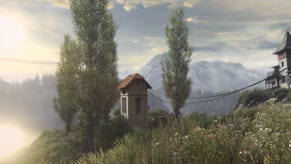The Vanishing of Ethan Carter review
The big sleeper.
The Vanishing of Ethan Carter begins by telling you that it is not going to hold your hand, and it is true to its word. As you emerge from a railway tunnel into an area of woodland in the shoes of detective Paul Prospero, there is no convenient low branch under which you must PRESS CTRL TO CROUCH, nor any low walls inviting you to PRESS SPACE TO JUMP. As far as the developer, Adrian Chmielarz's The Astronauts, is concerned, you can look up the buttons and then figure it out on your own. When you do, you discover there is no jumping in The Vanishing of Ethan Carter whatsoever. It's not that sort of game.
What sort of game it is remains splendidly elusive for some time, allowing you to simply enjoy your surroundings. The first thing that happens is you find yourself being snapped at by elaborate mantraps in the woods. They never quite get you, but you can feel the tension in every creaking branch as you walk slowly through the brush. Beyond the treeline is an old railway bridge that gives you panoramic views of a huge lake - more of an inland sea - and the dam, town and hills beyond. The Vanishing of Ethan Carter is set in one of those permanently autumnal corners of America where the late afternoon sun paints everything with a mixture of warmth and sorrow, and the game's artists wield this evocative palette like the old masters, sending you to Steam's screenshot button every few seconds.

You have been summoned to this place, Red Creek Valley, by a letter from a boy called Ethan Carter. "There are places that exist that very few people can see. Ethan could have drawn a map," says Prospero, whose noirish intonation is a cool match for the sparse, brilliant writing throughout. (Anyone who thought Alan Wake was an airport potboiler with delusions of grandeur will feel thoroughly vindicated by a couple of hours with The Vanishing of Ethan Carter.) But there's no one around, only suggestions of what might have happened. Over the railway bridge you find quite a graphic suggestion: a pair of severed legs, a blood trail, a corpse and some scattered debris.
Prospero, we are given to infer, is more than just your average gumshoe. By identifying and replacing clues in the environment, he can piece together events and review what happened in a flashback. This helps him establish how the victim died, but by listening to the protagonists we also learn a little bit about what might have happened to Ethan Carter. The crime-scene reconstruction mechanic is a little clumsy - you're supposed to manually tweak the running order of each event until you get the chronology right and it requires a bit of trial and error - but the game has so much evident class that it gets away with it and you are happy to suspend your disbelief just to keep scratching its fascinating itch.

Some otherworldly hysteria seems to have gripped Ethan's family and it's clear things in Red Creek Valley became rather grim, but where other games might spin this into jump scares and urgent sprints for safety, The Vanishing of Ethan Carter is quieter and more reflective. In between reconstructing grisly events that point to what happened, you are sucked into puzzles - some quite elaborate - that tell you about Ethan's relationship with his family and how these hardy folk struggled to find time and understanding for his love of writing and retreating into his imagination. It would be a crime to spoil any of these sequences, but they combine simple gameplay ideas, environmental design and great writing in ways that make you want to hold them up to people who don't understand games and go, "SEE! THIS!" There is one quite early on that is so audacious it has no right to work, but it works perfectly. It's my favourite thing in games this year.
Ethan and his family are mostly absent, despite being at the centre of events, so it's left to Red Creek itself to give the game its character, and it's more than up to the task. Like Kaitlin's house in Gone Home, this is a wholly convincing space where everything belongs where you find it and tells its own story, from the church on the hill to the rusting metal lift that takes you down to the foot of the dam. This may be an indie studio's debut game, but there is so much craft and experience in the architecture, use of light and geographical composition to explain Red Creek Valley that it's hard not to stand around marvelling, finger poised over F12 yet again, as you stare back across the water to where you started, marvel at a small house teetering on a precipice or just look at the floor. This is a game where you spend a good bit of time staring down at the ground looking for clues, so the developers have decorated every inch of it with great care and attention.

It's a shame to leave this place, but The Vanishing of Ethan Carter only lasts a few hours. I certainly advise you to take your time with it. When you do get to the end, the way it brings everything together is smart and stylish, and like everything else in the game it is open to interpretation without being pushy about what it's telling you. The only frustrating thing about it - about the whole game, perhaps - is that this otherwise-subtle adventure, where nothing ever feels forced, precedes it by suddenly and unsubtly telling you to go back - perhaps across the entire map - to tie up any loose ends before you can finish it. It's jarringly out of character, although it feels like a forgivable misstep in the wider context.
For one thing, The Vanishing of Ethan Carter leaves you with several amazing memories; moments that you will want to talk to your friends about for hours and will take great pains not to spoil for other people. The fact it packs those so painlessly into a three-hour game while other developers create empty works that take ten times as long to complete speaks volumes. And it leaves you with things to contemplate. This gentle tale about a boy who is trying to escape from the world - and perhaps make sense of it - by retreating into his imagination will make you think about your own life in a way most games never do.
As soon as I finished The Vanishing of Ethan Carter, I started it again and was greeted by that same warning. "This game is a narrative experience that does not hold your hand." Originally I thought it was telling me that I was going to be challenged by what followed and that I shouldn't expect any help in figuring it out. And I still think that. But I also suspect The Vanishing of Ethan Carter, which rarely uses a word more than it has to, is making a broader point when it says it doesn't intend to hold your hand.









